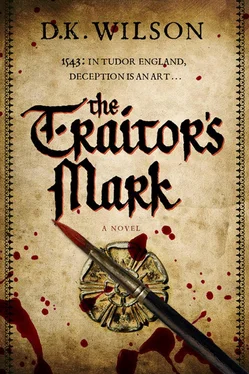D. Wilson - The Traitor’s Mark
Здесь есть возможность читать онлайн «D. Wilson - The Traitor’s Mark» весь текст электронной книги совершенно бесплатно (целиком полную версию без сокращений). В некоторых случаях можно слушать аудио, скачать через торрент в формате fb2 и присутствует краткое содержание. Год выпуска: 0101, Издательство: Pegasus Books, Жанр: Исторический детектив, на английском языке. Описание произведения, (предисловие) а так же отзывы посетителей доступны на портале библиотеки ЛибКат.
- Название:The Traitor’s Mark
- Автор:
- Издательство:Pegasus Books
- Жанр:
- Год:0101
- ISBN:нет данных
- Рейтинг книги:5 / 5. Голосов: 1
-
Избранное:Добавить в избранное
- Отзывы:
-
Ваша оценка:
- 100
- 1
- 2
- 3
- 4
- 5
The Traitor’s Mark: краткое содержание, описание и аннотация
Предлагаем к чтению аннотацию, описание, краткое содержание или предисловие (зависит от того, что написал сам автор книги «The Traitor’s Mark»). Если вы не нашли необходимую информацию о книге — напишите в комментариях, мы постараемся отыскать её.
The Traitor’s Mark — читать онлайн бесплатно полную книгу (весь текст) целиком
Ниже представлен текст книги, разбитый по страницам. Система сохранения места последней прочитанной страницы, позволяет с удобством читать онлайн бесплатно книгу «The Traitor’s Mark», без необходимости каждый раз заново искать на чём Вы остановились. Поставьте закладку, и сможете в любой момент перейти на страницу, на которой закончили чтение.
Интервал:
Закладка:
‘They took you for a heretic? But why?’
‘It seems that some of the books I’d been lent were banned. I swear I did not know it. They were just commentaries written by foreign scholars about various books of the Bible. Well, I soon discovered I wasn’t alone. The guards threw me into a cell with Robert Testwood – my friend and a fellow choirman. And there were two others, Robert Bennett, a local lawyer, and Henry Filmer, who kept a tailor’s shop in Peascod Street. The door was locked and there we stayed for a couple of days.’
‘Were these other men heretics?’
‘No more than I, I’m sure. But that’s little to the point. Once you’re marked for the fire nothing can save you. They go pestering friends and neighbours, looking for people who will testify against you.’
‘And who are “they”?’I asked.
‘The Bishop of Winchester’s men, as I later discovered.’
‘You’re sure.’
‘Oh, yes. He had us taken to the Marshalsea prison in Southwark, close to his palace so that he could interrogate us in person. He kept me there for four months. Twice he had me to his own house, shouting insults and threats at me.’
The Marshalsea! An image of that stinking, vermin-infested, overcrowded hovel came into my mind. As a prison it was, by some people, feared more than the Tower. The lees of the criminal world were habitually swilled into it. Highway robbers, murderers, rebels and other desperate men were shut up there to await trial (often indefinitely) and were known to beg for their appointment with the hangman, in preference to spending another day in the Marshalsea. The thought of this gentle musician having been incarcerated there was an affront to reason and certainly an affront to justice.
‘How appalling!’ I said.
‘I wouldn’t wish it on any human soul – Christian or heathen. Everything was done there to make me confess my supposed heresies and provide the names of others. Terrible things. They still haunt my dreams. By the time I was released my wife was hard put to recognise me. My body was black from the beatings. I could scarcely hobble because the irons had chafed my ankles.’
‘I’m so sorry for your ordeal,’ I said. ‘But one thing puzzles me – why was Bishop Gardiner personally interested in the opinions of a humble singing man?’
‘Exactly!’ Marbeck stopped in his tracks to emphasise the point. ‘A thousand times and more I asked myself the question, “Why me?”. Then I realised that they cared not a farthing for what I believed. I could roast in hell as an unrepentant heretic for all they cared. What they wanted from me was names.’
‘Names?’
‘Aye. “Who aided you in your pernicious studies? Who seduced you with heretical books? You are no scholar; you could not have undertaken your wretched concordance unaided. You were set to it by your betters; men of the royal court. Who were they? Give us their names and we may yet save you from the fire.’”
‘And did you tell them what they wanted to know?’
‘Never. Though I thank God they didn’t put me to the torture. What I might have falsely confessed if they had racked me …’
‘But if you didn’t do their bidding how did you escape burning as an unrepentant heretic?’
Marbeck halted again and this time sank on to a stone bench. He shook his head and sighed deeply. ‘Oh, Master Treviot, it isn’t over! It isn’t over!’ The torchlight glistened on tears creeping down his cheeks. ‘I wish to God that it might be over; that I could go back to my family and bolt our door firmly against them. They’re too powerful, too clever, too relentless.’ He brushed a hand across his face.
I sat beside him. ‘I’m afraid I don’t understand …’
Marbeck grabbed my wrist, his grip almost painful. ‘The twenty-eighth of July was wet … but not wet enough. They burned Filmer and a local priest and Robbie Testwood in Windsor marketplace. Robbie was scarce more than a boy, a merry lad, always joking.’ Marbeck’s frame was now shaking. The tears flowed freely. Unchecked. ‘We were all of us guilty – according to the trial. Trial? Ptah!’ He spat violently. ‘The bishop’s man told the jury what verdict to bring. And we were all found guilty, all of us! The others burned. But, not Bennett and not me. Why?’ Marbeck turned his anguished face towards me. And now he was gabbling, words pouring out like rain from a waterspout. ‘Do you know what Gardiner said? He petitioned the king for a pardon because it would be a pity his majesty should lose “such a fine musician”. Lying, double-tongued hypocrite. He did it to buy me. To buy me! I must now be one of his ears around the court, listening for murmurs against the king’s laws and whispers of heresy. If I fail fresh charges will be brought against me. That is why I am sent here to his grace of Canterbury’s house. Officially I come with messages from Windsor, from the odious dean, Dr London. He’s thick with Winchester. They mean to destroy any of the king’s friends not of their party. Especially the archbishop. My real mission here is to learn all I can about him and those around him. I beg you, Master Treviot, if you are in his grace’s favour, warn him. He must have a care. He must guard himself against traitors. He must be sparing with his trust. He must not trust me!’
Marbeck stood abruptly and stumbled off along the cloister.
Comfortable as my allotted quarters were, I slept little that night. The hideous images Marbeck had conjured up recurred unbidden every time I tried to rid my mind of them. And the personal implications of his story for me were frightening. What was I being dragged into? Part of me was shouting, ‘Get yourself out of this.’ But there was another – a whisper, though insistent – which said, ‘You must do what you can to stop such villainy.’
When Cranmer summoned me back to his study the following morning I reported my conversation with the distracted choirman.
‘Poor John,’ Cranmer said. ‘I must see him and try to offer some comfort. At least his testimony seems to have been more persuasive than mine. I think you understand more clearly now the situation in which I am placed.’
‘Surely, Your Grace, if you were to report the Bishop of Winchester and his associates to the king, he would soon put a stop to their schemes.’
‘It is not so simple. His majesty will require proof. Just as Stephen Gardiner goes about to prove me a heretic, so I need to gain evidence of his stratagems. As I remarked yesterday, I have no alternative but to play the game of intrigue by the rules. The good bishop has a network of agents, as you have heard from the unfortunate John Marbeck. Master Holbein has been gathering information about this organisation and was on the point of discovering something vital. If he has been unmasked and forced into hiding, that is deeply worrying. Gardiner’s people are not only in Windsor. They are located throughout the land – in the royal court, in London, here in Canterbury, in many shires and certainly in Kent. There are leading men in this county who are against me – parish clergy, magistrates, townsmen, landowners. I, too, must have local people working for me. That is why I want you to discover all you can about your Kentish colleagues.’
‘You wish me to spy on my friends and neighbours?’
‘In a word, “yes”. I understand your reluctance. It does you credit. But reflect on this: any information you can gather about the plot against me may bring you closer to unmasking the villains who killed Master Holbein’s assistant.’
‘You think they were working for Bishop Gardiner?’
Cranmer frowned. ‘Stephen would never condone such an appalling crime. Of that I am sure. But is he able to control all those who work for him? That is a more open question. Now to practicalities. I have appointed a commission – on his majesty’s authority – to inquire into preaching throughout the diocese. It is headed by Sir Thomas Moyle, whom I’m sure you know.’
Читать дальшеИнтервал:
Закладка:
Похожие книги на «The Traitor’s Mark»
Представляем Вашему вниманию похожие книги на «The Traitor’s Mark» списком для выбора. Мы отобрали схожую по названию и смыслу литературу в надежде предоставить читателям больше вариантов отыскать новые, интересные, ещё непрочитанные произведения.
Обсуждение, отзывы о книге «The Traitor’s Mark» и просто собственные мнения читателей. Оставьте ваши комментарии, напишите, что Вы думаете о произведении, его смысле или главных героях. Укажите что конкретно понравилось, а что нет, и почему Вы так считаете.












